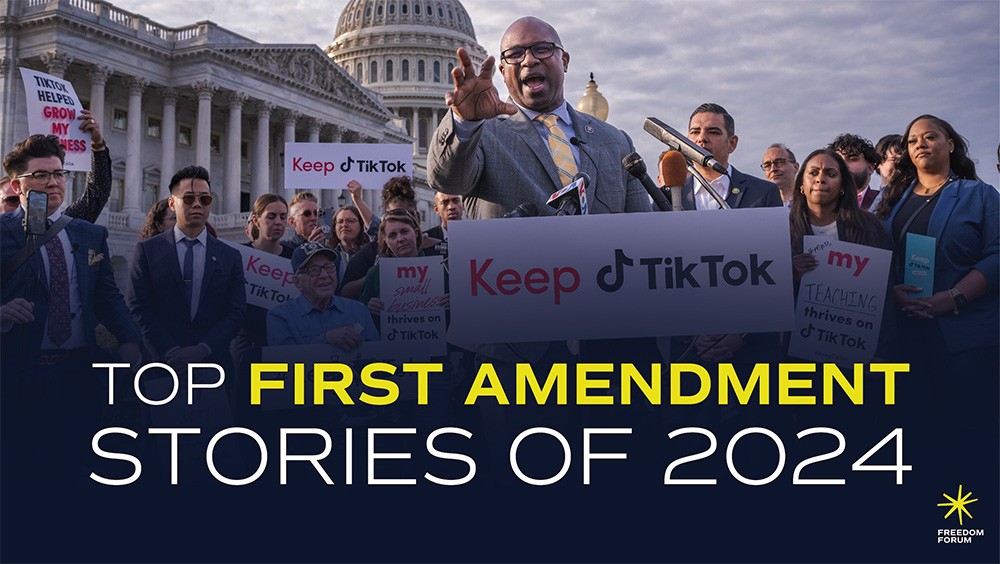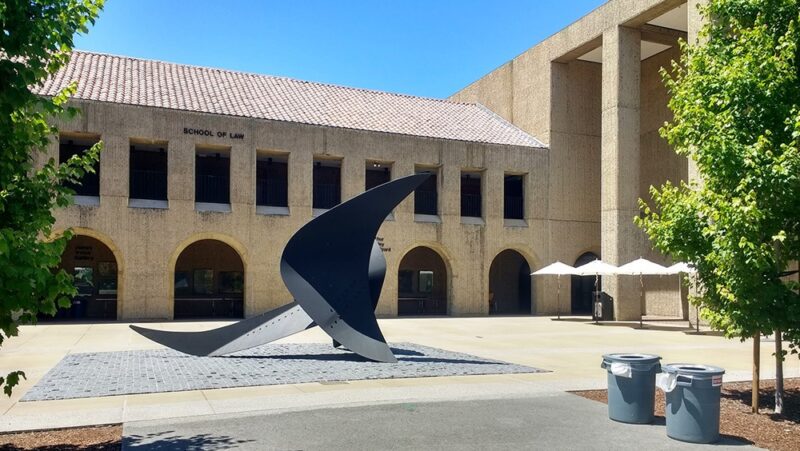First Amendment Stories of 2024: A Year in Review

The First Amendment is in the news all around us, from government regulation of social media and campus protests to religion in schools and book bans.
As 2024 ends, here are seven themes and related First Amendment stories that were prominent in the news – and our lives – this year.
Discover the top First Amendment stories of 2024
Government regulation of social media
Social media regulation is at the top of our list because of recent state laws and some U.S. Supreme Court guidance on the First Amendment protections social media enjoys.
Age verification laws
Consistent with a trend in recent years, various states and the federal government have pending or enacted laws that prevent children from accessing social media without parental permission – or at all. By Thanksgiving, forty states and Puerto Rico had introduced at least one bill that would limit minors’ access to social media or set the stage for limiting that access in the future. Fifty such laws were enacted.
The bigger story is that most age verification laws – including some passed in earlier years – have been struck down because they violate the First Amendment, with the reason most often cited by courts being that they are too broad and would prevent adults from accessing material they have every right to see. NetChoice, a trade association representing many large social media companies, sued to stop enforcement of age verification laws in California, Ohio, Mississippi, Texas and Utah this year, along with Arkansas in 2023.
TikTok ban
In November 2023, a federal district court in Montana ruled that a state law banning TikTok anywhere in the state violates the First Amendment.
An appeal was put on hold after the passage of a federal law that requires TikTok’s parent company ByteDance to (1) sell TikTok by Jan. 19, 2025, (2) stop operating TikTok in the United States by that date, or (3) pay a massive fine. ByteDance filed a lawsuit arguing that the law violates the First Amendment, as did separate groups of TikTok creators and users. On Dec. 6, 2024, a U.S. Court of Appeals said the law does not violate the First Amendment. On Dec. 18, the Supreme Court handed TikTok a lifeline by announcing it will hear oral arguments on Jan. 10, which is a compressed timeline designed to meet the law's Jan. 19 deadline for ByteDance to sell TikTok or stop operating in the U.S.
The Supreme Court weighs in
The U.S. Supreme Court decided five cases related to social media and the First Amendment in 2024 (as well as two cases involving government retaliation for the exercise of free speech and one involving trademark registrations) with a consistent theme that the First Amendment protects the editorial decision-making of social media companies and all the free speech rights of individual social media users:
- In NetChoice LLC v. Paxton and Moody v. NetChoice LLC, the court looked at Texas and Florida’s laws to limit social media companies’ ability to moderate content and ban users, sending both cases back to lower courts for further review but clearly stating social media companies are protected by the First Amendment when making these content-related decisions.
- In Murthy v. Missouri, the court held that neither Missouri and Louisiana nor individual social media users could sue the Biden administration for potential violations of the First Amendment after the administration had asked large social media platforms to moderate content it believed to be harmful. The court based its ruling on the fact that there was no direct connection between a request by the administration and the removal of any content but also said that evidence of such a connection would violate the First Amendment rights of both social media platforms and affected social media users.
- In Lindke v. Freed and O’Connor-Ratliff v. Garnier, the court created a framework for determining when a social media account operated by a government official is public or private for the purpose of determining whether it could be a First Amendment violation when that account owner blocks a follower.
Campus protests
College campuses across the country erupted in protest this spring over the Israel-Hamas war that began in October 2023. As students and others took sides in the war, divisiveness also grew as to how campus administrators and law enforcement should respond to on-campus protests, especially when students occupied campus buildings or built encampments. Freedom Forum’s “The First Amendment: Where America Stands” survey found nearly three-quarters of Americans say that peaceful protest is fine but taking over campus buildings and encampments goes too far.
Campus administrators initially agreed, allowing protests – and sometimes encampments – but eventually disbanding those encampments, claiming they interfered with the educational process or created health and safety concerns. An attempt to prevent all protests on campus at the University of Maryland-College Park on the one-year anniversary of the war was rejected by a federal judge as a violation of the First Amendment.
The war also generated other forms of protest and petition on campus that are not protected by the First Amendment, including shouting down invited speakers and trespassing on private property and at events.
As a result, many colleges and universities rewrote their campus speech and assembly policies in advance of the 2024-2025 school year, including the University of California system, Indiana University and James Madison University.
Religion and education
In 2022, two Supreme Court cases expanded the free exercise of religion in public schools: Kennedy v. Bremerton School District and Carson v. Makin. In 2024, some states seized the opportunity to act on that expansion:
- Louisiana passed a law requiring the Ten Commandments to be posted in all public school classrooms. In November, a federal district court judge held that this law violates the First Amendment, but the state is expected to appeal that decision.
- The Oklahoma State Department of Education mandated that the Bible be taught in all schools, which is being challenged in Oklahoma state court.
- Oklahoma also became the first state in the nation to allow taxpayer money to fund religious charter schools, but this was struck down by the Oklahoma Supreme Court as a violation of the establishment clause.
- A Florida school district proposed to allow volunteer chaplains in public schools to support students, but the proposal was pulled after the Satanic Temple expressed interest in participating.
Finally, a battle is playing out nationwide regarding policies requiring teachers to identify students by their preferred names or pronouns, which can come into conflict with a teacher’s – and sometimes a student’s – religious beliefs that there are only two genders that are assigned at birth.
Gag orders
Donald Trump faced four different court cases in 2024. Several included gag orders limiting his ability to speak publicly about the cases and/or trial participants (lawyers, witnesses, court staff, etc.). These orders were largely upheld on appeal because they were narrowly drawn to prevent only speech that might prevent a fair trial or result in witness intimidation but still allowed him to otherwise speak freely, particularly on political matters.
Election speech and misinformation
According to Freedom Forum’s “Where America Stands” survey, more than 70% of Americans were extremely or moderately concerned about misinformation in the 2024 election. But they also didn’t know how best to combat it.
Yet, five states – Minnesota, Michigan, California, Washington and Texas – have laws regulating deepfakes and other content created using AI in the context of elections, while 30 others proposed similar laws this year. One California law prohibiting deceptive election communications was struck down by a federal court in October while another requiring blocking or labeling of deepfake content has been challenged in court.
Book bans
There was no shortage of controversies surrounding books in public schools and public libraries in 2024, including challenges of individual books from individual schools and libraries across the country.
But there were also some twists on the familiar theme and standout stories:
- A Florida school district banned a book about banned books.
- Utah enacted a first-of-its-kind statewide ban on books.
- Parents in a Maryland school district were told they could not opt their children out of a classroom lesson that included LGBTQ+ books (there was no attempt to ban the books entirely).
Another development was the increase in attempts to restrict access to libraries entirely (which occurred in Idaho) or cut ties with professional librarians (which occurred in Georgia and Louisiana).
Reporters’ access to people and events
The First Amendment protects not only a reporter’s right to publish but also to gather news. But 2024 saw a number of instances in which reporters, including student journalists, were denied access to major events. Not all raised First Amendment issues. Some situations – like political parties’ conventions or caucuses – did not involve the government taking action to limit journalists’ press freedom but barring reporters from the statehouse or a sheriff’s news conference might.
Student journalists faced this problem when attempting to cover the on-campus protests identified earlier, as campus administrators and/or law enforcement often did not differentiate between the student protesters and the student journalists merely observing and reporting on the protests. The arrest of student journalists on public campuses raises significant First Amendment concerns.
Learn more about the First Amendment in 2025!
This is merely an overview of the major stories and themes from 2024. You can learn more by diving deeper into our website and by following us on social media via X, Facebook, TikTok and YouTube.
Kevin Goldberg is a First Amendment specialist for Freedom Forum. He can be reached at kgoldberg@freedomforum.org.
A First Amendment Analysis of the Stanford Protests
Is Opinion Writing Protected by the First Amendment?
Related Content
Religion. Speech. Press. Assembly. Petition.
Learn about the First Amendment.

